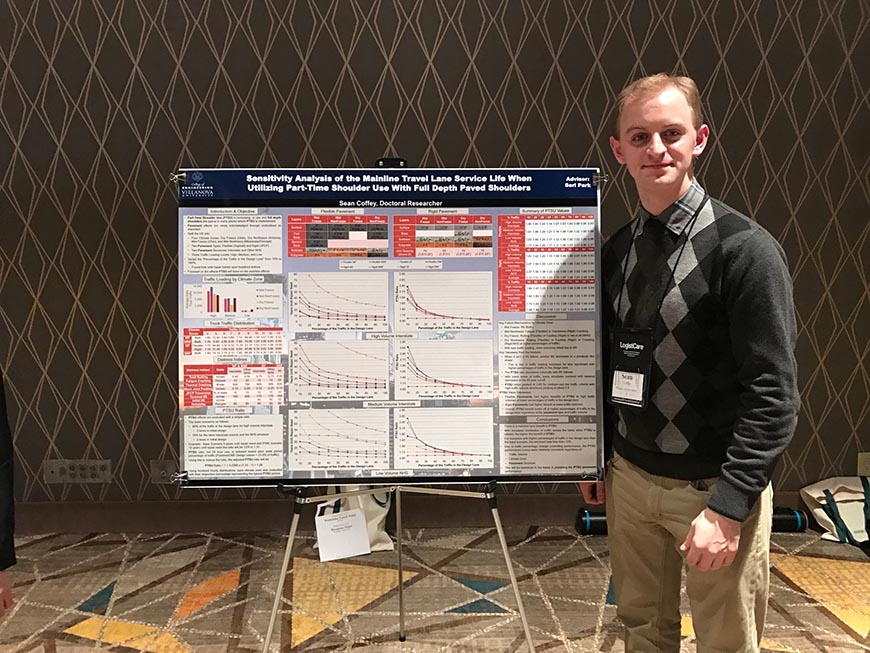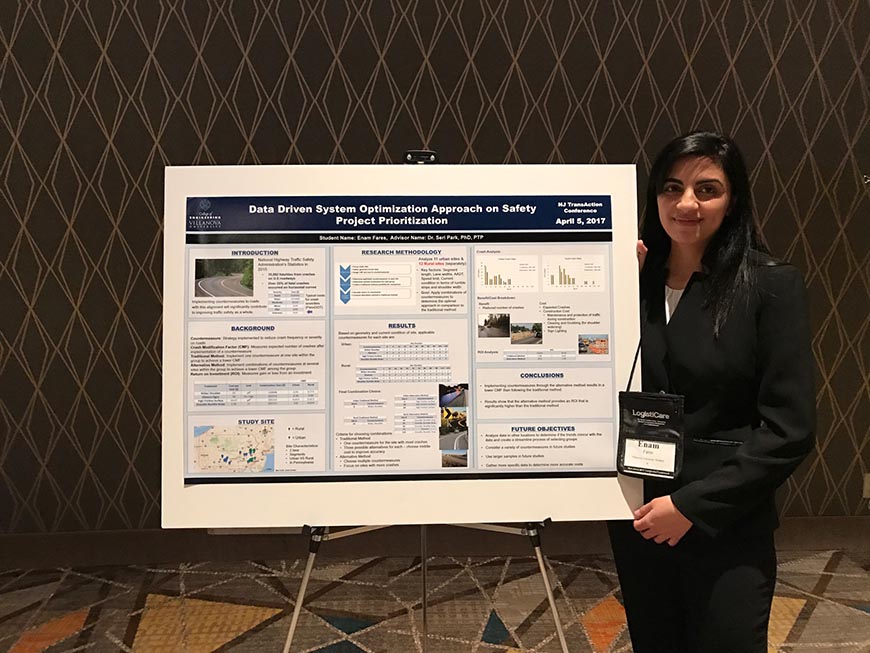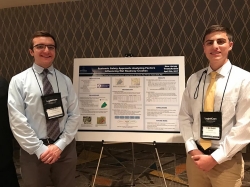Transportation Engineering Research Experience Proves Rewarding
More than half of Villanova's College of Engineering undergraduates pursue a research opportunity before graduation. Some take on independent study, while others work with faculty on a wide variety of projects. In early April, four Villanova students had the pleasure of presenting their research at the annual New Jersey TransAction conference held in Atlantic City. Hundreds of attendees from more than 20 states participated in the event's workshop sessions specializing in bus, rail, roads, bridges, goods movement, pedestrian/bicycle, paratransit, community transportation, ports and much more. This was the first year that the conference invited a number of engineering schools to participate in a poster session highlighting students' work.
In addition to PhD candidate Sean Coffey, who presented shoulder use research, and Enam Fares ’17 CE, who shared “Data Driven System Optimization Approach on Safety Project Prioritization,” Villanova Civil Engineering seniors Thomas Saldutti and Nicholas Zoccoli also enjoyed the experience of presenting at an industry conference. The interdisciplinary nature of their research and its compelling findings made the opportunity that much more memorable. Advised by Clare Boothe Luce Assistant Professor Seri Park, PhD, and Assistant Professor Virginia Smith, PhD, Tom's and Nick's poster was titled “Exploring the Integration of Flood Risk Factor into Roadway Systemic Safety Assessment Approach.”

Doctoral candidate Sean Coffey

Enam Fares

Nicholas Zoccoli and Thomas Saldutti
“Tom's and Nick's research is a great example of interdisciplinary work within departments,” says transportation engineering expert Dr. Park, who explains that their findings grew out of a casual conversation she had with Dr. Smith, whose expertise is in water resources engineering. “I had a valuable data set from previous research that I wanted to do more with, but I didn't have the analysis tools I needed.” Working with Dr. Smith, the students were able to conduct a robust study in which they applied a number of physical variables to the data, leading to results that captured the attention of both regional and federal transportation agencies.
In addition to sparking the interest of attendees at the TransAction conference, Tom's and Nick's work was equally well-received at an April meeting of the Infrastructure & Climate Network, which attracts representatives from state departments of transportation, federal agencies and academia. “Government entities like to see how research being conducted in academia can answer their questions,” says Dr. Smith.
While outcomes may be the highlight of any research study, the value of the research experience itself should not be overlooked. Nick explains that he learned a lot in the process. “Doing research definitely improved my technical writing skills and helped me understand how studies are conducted and the numerous types of analyses that can be performed. I also learned more about academia and how new research comes about and gains credibility in the field.” He adds, “This specific project has been especially rewarding since it taught me how to consider multiple disciplines in both the approaches to and applications of a study.”
Tom, who was introduced to Geographic Information Systems (GIS) through the research, notes that he too gained a great deal from the experience. “It made me realize that the best way to learn engineering programs is through trial and error. Learning about a new software and then struggling through its application in an actual project was a very rewarding process. The experience also made me appreciate the complex nature of real world problems, which is not always evident in class.”
Tom, Nick and Drs. Park and Smith plan to publish follow-up papers and submit this research to the Transportation Research Board this summer. They also believe that the project has a lot of potential for future work. Tom, who has accepted a full-time position as a water resources engineer with Johnson, Mirmiran, and Thompson in Philadelphia and will pursue his master’s in Civil Engineering at Villanova, says he will focus on preparing his data and existing work so that the next student can take over. Nick, who will pursue his master's degree in Civil Engineering at Villanova, hopes to contribute to further research any way he can.
